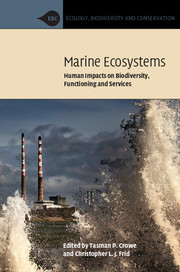Book contents
- Frontmatter
- Contents
- List of contributors
- Part I Key concepts
- 1 Introduction
- 2 Ecosystem services and benefits from marine ecosystems
- 3 Assessing human impacts on marine ecosystems
- 4 Modifiers of impacts on marine ecosystems: disturbance regimes, multiple stressors and receiving environments
- 5 Impacts of changing biodiversity on marine ecosystem functioning
- Part II Impacts of human activities and pressures
- Part III Synthesis and conclusions
- Index
- Plate Section
- References
2 - Ecosystem services and benefits from marine ecosystems
from Part I - Key concepts
Published online by Cambridge University Press: 05 June 2015
- Frontmatter
- Contents
- List of contributors
- Part I Key concepts
- 1 Introduction
- 2 Ecosystem services and benefits from marine ecosystems
- 3 Assessing human impacts on marine ecosystems
- 4 Modifiers of impacts on marine ecosystems: disturbance regimes, multiple stressors and receiving environments
- 5 Impacts of changing biodiversity on marine ecosystem functioning
- Part II Impacts of human activities and pressures
- Part III Synthesis and conclusions
- Index
- Plate Section
- References
Summary
Introduction
For some time environmentally minded citizens, nongovernmental organisations (NGOs) and other pressure groups have advocated the need for protection and conservation of species and habitats, in both terrestrial and marine ecosystems. There has been frustration that this advocacy has not been fully taken up by environmental policy makers and managers. Similarly, the same policy makers and managers are aware that significant changes to ecosystems have been taking place that require policies and management actions to halt, slow or reverse these changes but that these are costly to implement. In times of competing needs for public funds, it has always been difficult to justify such measures. Yet there has been a growing awareness that changes in ecosystems impact on humans both directly and indirectly, for example through global reductions in fish stocks for food and polluted waters that are unfit for bathing. Humans have recognised their connections and dependence on ecosystems for millennia and Mooney and Ehrlich (1997) assert that concern for our impacts on these connections was formally raised by Marsh in 1864.
In the 1970s, the terms environmental services and then ecosystem services were coined to indicate the positive benefits society gained from the functioning and properties of ecosystems. Mooney and Ehrlich (1997) and Gómez-Baggethun et al. (2009) provide a modern history of the increasing interest in ecosystem services. For marine scientists, a pivotal paper was Costanza et al. (1997) in which the value of the world's ecosystems to people was estimated in monetary terms with marine ecosystems having the highest values of all. This presentation of valuation of ecosystem services was published in Nature, a prestigious and widely read journal for natural scientists. It alerted researchers and those who had been concerned about the state of the environment and its ongoing degradation to the opportunity to attempt to quantify and disseminate the importance of ecosystems and their biodiversity from an anthropocentric viewpoint.
- Type
- Chapter
- Information
- Marine EcosystemsHuman Impacts on Biodiversity, Functioning and Services, pp. 21 - 41Publisher: Cambridge University PressPrint publication year: 2015
References
Accessibility information
- 1
- Cited by

